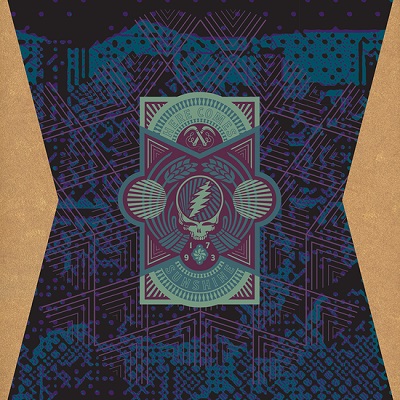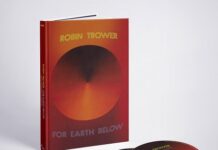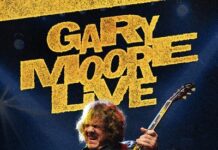Watch out, it’s another live release from the Grateful Dead! Yeah, there’s a regular rotation of the band’s live material bubbling to the surface, though you might want to take a step back for Here Comes Sunshine 1973. We’re talking about a 17-disc lineup featuring five never-ever-released shows recorded in the Spring of 1973, arguably a peak period during the union of Jerry Garcia, Bobby Weir, Bill Kreutzmann, Phil Lesh, and Keith and Donna Jean Godchaux.
By all accounts, 1973 was a pivotal year for the Grateful Dead. Ron “Pigpen” McKernan, a founding member who sang, played keyboards and blew the harp passed away after a long illness on March 8 (he played his last show with the band the previous summer). Regardless, new music was already brewing. “Eyes Of The World,” “Here Comes Sunshine” and “China Doll” all made their live debuts in February, and would later land on 1973’s Wake of the Flood, the group’s first album on their own label, and 1974’s From Mars Hotel. The Dead would develop into a more refined ensemble than it was in the 60s, though it still pounded away to its own drum with little disruption.
Coming off an East coast, 11-date early Spring tour in 1973, the band was in fine form when they arrived in Des Moines, Iowa, on May 13. The Mother Day’s show was an electric three-set burner where one attendee said it rained during “Looks Like Rain,” the sun came out for the next number, “Here Comes Sunshine,” and a double rainbow showed up for “Sugar Magnolia.” You can practically feel the drops as “Looks Like Rain” leaks through your speakers, though Lesh’s “Box Of Rain” receives a decent soaking as well.
After you’ve dried off and caught your breath, you can jump over to the Santa Barbara show from May 20. Because they apparently worked out so well in Iowa, the Dead reprised the “China Cat Sunflower” and “I Know You Rider” combo platter; an epic, somewhat shorter “Playing In The Band”; and a poignant “Jack Straw,” where Garcia and Weir trade verses and cross their six-stringers as Keith Godchaux’s sleight-of-hand piano work shimmies through the gaps.
The set lists didn’t vary as much as they would after they’d recorded a solid seven studio albums by the end of the 70s (the 80s only got three). Back then, no one minded hearing “Sugaree,” “Truckin’,” and the newer songs the band played night after night.
Legend has it that a falling speaker almost ended the afternoon concert in Santa Barbara, but the Dead soldiered through, delivering a magnificent performance that includes a lively cover of Noah Lewis’ “Big Railroad Blues,” along with an enticing “Jam” that meanders before melting into a “Drums” segment. That’s eventually swallowed up by Lesh’s rumbling bass intro into “The Other One,” which, in turn, mutates into a chaotic, galloping rumble of palatial elegance. It was a game of musical dominoes that likely kept the beachside town buzzing into the following week.
A trip to the West Coast wouldn’t complete without a visit to San Francisco for yet another three-set concert at Kezar Stadium. The homecoming was bittersweet as this was the Dead’s first appearance in the City by the Bay without their beloved Pigpen. It was another afternoon show with more stellar trips through “Jack Straw,” “Looks Like Rain,” “Playing In The Band,” and “Here Comes Sunshine.” They roll through a spirited “The Race is On.” Donna Jean Godchaux grabs the spotlight on Loretta Lynn’s “You Ain’t Woman Enough,” although her vocal is a bit low in the mix.
Though “He’s Gone” wasn’t written with Pigpen in mind, it would become a significant tribute to the late musician. One can’t help but think its inclusion in the Kezar setlist was deliberate. The dynamics around this particular version, especially during the mid-section, conjures a divine aura that vividly summons up memories of Pigpen and the origins of the Grateful Dead. You have to imagine there wasn’t a dry eye in the house after they finished this number.
The acclaimed two shows on June 9 and 10 at Robert F. Kennedy Memorial Stadium, Washington, D.C., recorded by the one and only Owsley “Bear” Stanley, may be the crown jewel of the collection. The weekend run included the Allman Brothers Band on the bill, so there were high expectations that somehow the two camps would intermingle. The first show is the shortest of all five and has many of the same songs they’d been playing. Still, it resonates with especially punchy renditions of Chuck Berry’s “Promised Land,” along with “Deal,” Loose Lucy,” and “Beat It Down The Line.”
Lesh really sinks his teeth into an especially gutsy “Box Of Rain,” and “Greatest Story Ever Told” stands as a fine example of how tight the band was. Without second drummer Mickey Hart, who left the Dead in 1971 and was fully reinstated by 1976, original timekeeper Bill Kreutzmann became an accelerated heartbeat that help push the songs in new directions.
On June 10, 1973, the Dead were joined by Dickey Betts and Butch Trucks of the Allman Brothers Band for a climatic third set. In addition to its inclusion with the 17-disc Here Comes Sunshine 1973, the near-five-hour show is also available as a four-CD and eight-LP set. The uncharacteristic opener “Morning Dew” effectively lifts off and pulls you in as it builds and blooms. A rather boomy “Ramble On Rose” has Garcia purring, while “Wave That Flag,” another new one that would become “U.S. Blues” after this performance, will have you up and saluting Old Glory before your dancing shoes are tied.
There’s little doubt “Bird Song” tumbles and tosses its melody around with the ease of a swinging pendulum, accented by Kreutzmann’s subtle touch. At 26 minutes, “Dark Star” is everything you could imagine it to be and more. Lesh turns his bass into a lead instrument as Kreutzmann circles around the changes like a serpent sizing up its adversaries, looking for a way in. Back to the refrain, the song dissolves into a gorgeous “He’s Gone,” followed by an equally alluring “Wharf Rat.”
The third set lightly moves forward with a tepid stab at Bob Dylan’s “It Take A Lot to Laugh, It Take A Train To Cry.” When all else fails, oldies like “That’s Alright Mama,” “Promised Land,” “Not Fade Away” and “Johnny B. Goode” were obvious go-to hipshakers guaranteed to keep the stadium on their feet and engaged until the very end. Garcia and Dickey Betts get especially rambunctious on their guitars during “Not Fade Away” and “Goin’ Down The Road Feeling Bad,” turning it into the kind of Allman Brothers Band and Grateful Dead collective that would inspire over a half-million souls to venture to Watkins Glen the following month.
The Here Comes Sunshine 1973 box set, a Dead.net exclusive, is as impressive as its contents. It’s all loaded up with liner notes, show-specific details, a custom-dyed Tenugui and a poster. No matter what format you go with, you can count this release as exceptional to the others that have come before and after as the vault is continually excavated for sonic treasure. You’ll want this one to settle in — anticipation has been unusually high for these recordings to become legitimately available. It only took 50 years, but it was most definitely worth the wait.
~ Shawn Perry




















